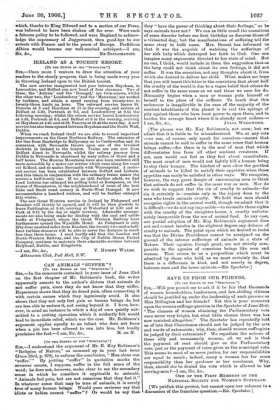[TO TOR EDITOR Or TRY e'srscreroa.")
understand the argument of Mr. E. Kay Robinson's "Religion of Nature," as summed up in your last issue (June 23rd, p. 979), to enforce the conclusion, " Man alone can • suffer.'" By putting "suffer" in quotation marks the 'reviewer means, I suppose, suffer in the full sense of the word; he does not, however, make clear to me the secondary sense in which he considers it applicable to animals. -" Animals feel pain, but are not conscious that they feel it."
• In whatever sense that may be true of animals, it is surely -.true of many human beings. Would your reviewer say that -idiots or babies cannot "suffer" P Or would he say that
they "have the power of thinking about their feelings," as he says animals have not P We can as little recall the sensations of some disorder before our first birthday as discover thos&of a vivisected dog; but the manifestations of suffering tell the same story in both cases. Mrs. Besant has informed us that it was the anguish of watching the sufferings .of her sick baby which destroyed her faith in God. One can imagine many arguments directed to her state of mind. But no one, I think, would include in them the suggestion thataas the baby could not think about its own feelings, it did not suffer. It was the sensation, not any thoughts about it, from which she desired to deliver her child. What makes me hope that you will insert this letter is the conviction that about half the cruelty of the world is due to a vague belief that others do not suffer in the same sense as we and those we care for do. Humanity begins when a man or woman puts himself or herself in the place of the sufferer. To teach that this endeavour is inapplicable in the case of the majority of the sentient inhabitants of this planet is to seal the springs of pity against those who have least power to open them, and to harden the average heart where it is already most callous.
[The phrase was Mr. Kay Robinson's, not ours; but we admit that it is liable to be misunderstood. We, at any rats —we can, of course, only speak for ourselves—meant that animals cannot be said to suffer in the same sense that human beings suffer,—for there is in the soul of man that which differentiates him from all other sentient creatures. If not, men would not feel as they feel about cannibalism. The most cruel of men would not lightly kill a human being to stay their hunger. The kindest of men allow the gentlest of animals to be killed to satisfy their appetites when those appetites can easily be satisfied in other ways. We recognise, however, the very great danger of encouraging men to think that animals do not suffer in the same way as men. Nor do we wish to suggest that the sin of cruelty to animals—for sin it certainly is—consists only in the injury done to the man who treats animals cruelly. We hold that men should recognise rights in the animal world, though we admit that fit is difficult—we do not say impossible—to reconcile those rights with the cruelty of the slaughter-house, a cruelty unfortu- nately inseparable from the use of animal food. In any case, our partial adoption of Mr. Kay Robinson's argument does not and cannot involve in the slightest degree any defence of cruelty to animals. The point upon which we desired to insist was that the Divine Providence cannot be arraigned 'on the ground of the intense sufferings of animals in a state of Nature. Their agonies, though great, are not strictly com- parable to the agonies of conscious beings like men and women. That seems to us a proposition which must be admitted by those who hold, as we most certainly do, that there is a difference in kind, and not merely in degree, between man and the lower animals.—En. Spectator.]


























































 Previous page
Previous page